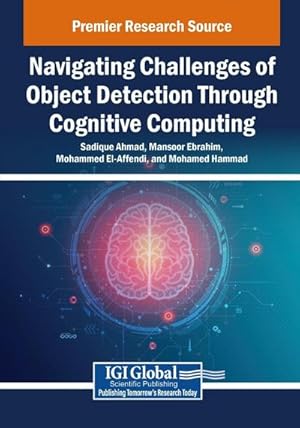Sinopsis:
Cognitive computing is transforming how machines perceive, analyze, and make intelligent decisions, enabling breakthroughs in object detection, segmentation, and image processing. By integrating cognitive algorithms with machine learning, this technology enhances automation, accuracy, and efficiency across industries such as healthcare, finance, and agriculture. The ability of machines to mimic human reasoning opens new frontiers for innovation, leading to smarter diagnostics, risk assessments, and precision-driven solutions. As cognitive computing evolves, its applications will continue to reshape industries, improve decision-making, and drive technological advancements that impact society on a global scale. Navigating Challenges of Object Detection Through Cognitive Computing explores the challenges of object detection across various domains and presents cognitive computing-based intelligent techniques to overcome them. It provides insights into innovative methodologies for improving detection accuracy in complex scenarios such as surface defect detection, indoor environments, adverse weather conditions, UAV imagery, and camouflaged object detection. Covering topics such as smart engineering, social medial sentiment analyses, and healthcare, this book is an excellent resource for computer engineers, computer scientists, industry practitioners, professionals, researchers, scholars, academicians, and more.
Acerca de los autores:
Sadique Ahmad (Member, IEEE) received the Ph.D. degree from the Department of Computer Sciences and Technology, Beijing Institute of Technology, China, in 2019, and the master’s degree from the Department of Computer Sciences, IMSciences University, Peshawar, Pakistan, in 2015. Currently, he is associated with Prince Sultan University, Riyadh, Saudi Arabia as a Researcher. He has many collaborative scientific activities with international teams in different research projects in the following international universities. He has authored more than 67 research articles, which are published in peer-reviewed journals, books and conferences, including top journals, such as Information Sciences, Science China Information Sciences, Computational Intelligence and Neuroscience, Physica-A, and IEEE Access. Currently, he is focusing on Deep Cognitive Modeling for Trust Management in Social Cybersecurity, IoT, and Blockchain technologies. Previously, he worked on Cognitive Computing, Deep Cognitive Modeling for Students' Performance Prediction, and Cognitive Modeling in Object Detection using remote sensing images.
Mansoor Ebrahim received the Ph.D. degree from Sunway University, Malaysia, in 2017. He is currently the Head of the Department of Software Engineering, Iqra University. His current research interests include image processing, network security, and VSN.
Mohamed A. ElAffendi is currently a Professor of computer science with the Department of Computer Science, Prince Sultan University, the Former Dean of CCIS, AIDE, the Rector, the Founder, and the Director of the Data Science Laboratory (EIAS), and the Founder and the Director of the Center of Excellence in CyberSecurity. His current research interests include data science, intelligent and cognitive systems, machine learning, and natural language processing.
Mohamed Hammad Received my Ph.D. degree in 2019, at the School of Computer Science and Technology, Harbin Institute of Technology, Harbin, China. I'm an assistant professor in the Faculty of Computers and Information, Menoufia University, Egypt. I'm currently a researcher in the EIAS Data Science Lab, College of Computer and Information Sciences, Prince Sultan University. My research interests include Biomedical Imaging, Bioinformatics, Cyber Security, IoT, Computer Vision, Machine Learning, Deep Learning, Pattern Recognition, and Biometrics. I have published more than 50 papers in international SCI-IF journals. Furthermore, I have served as an Editor Board member in PLOS ONE journal, an Editor Board member in BMC Bioinformatics journal, an Associate Editor in IJISP, a Topics Board editor in Forensic Sciences (MPDI) journal, a guest editor in many international journals such as IJDCF, Sensors (MDPI) and Information (MDPI). Reviewer of more than 500 papers for many prestigious journals and listed in the top 2% of scientists worldwide (According to the recently released list by Stanford University USA in 2022 and 2023.
"Sobre este título" puede pertenecer a otra edición de este libro.
![]()
